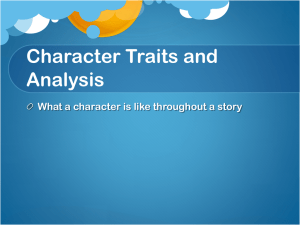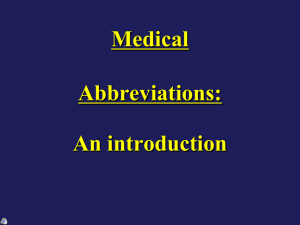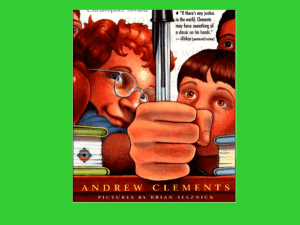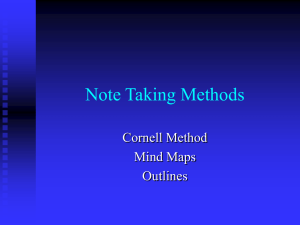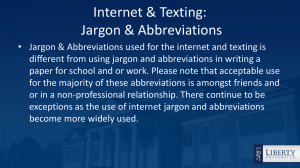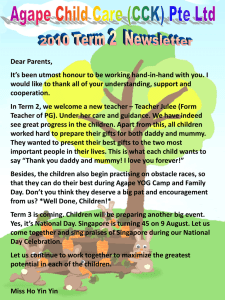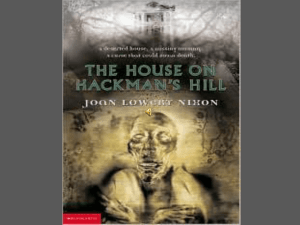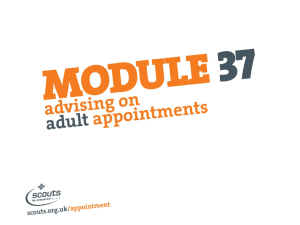Journey to Discovery Week 2
advertisement
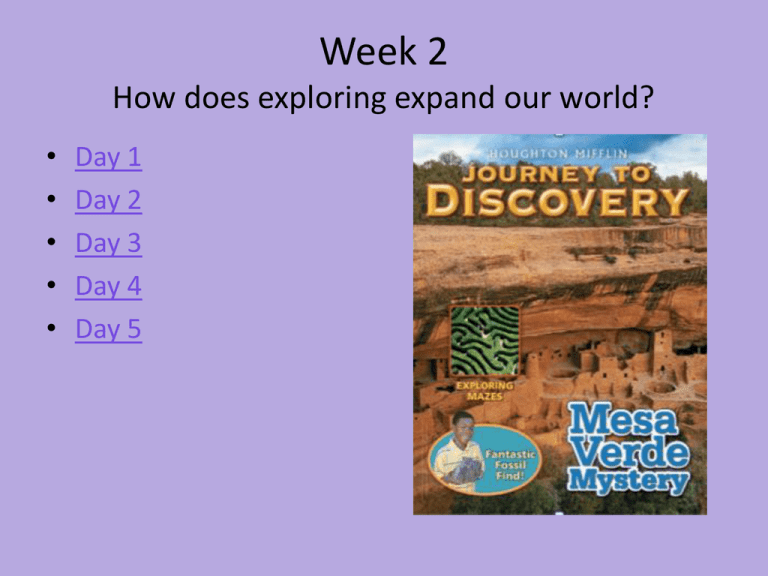
Week 2 How does exploring expand our world? • • • • • Day 1 Day 2 Day 3 Day 4 Day 5 Day 1 Magazine • Vocabulary and Oral Language – Read Aloud “The Paleo Indians” (T54-T55) – Develop Background (T57) • Comprehension – Understand Character; Analyze/Evaluate (T58-T59) Novel • Mysteries of the Mummy Kids • Skunk Scout • Frindle • Spelling – Day 1 (T84) • Grammar – Day 1 (T86) • Writing – Day 1 (T88) Back to Week 2 Flow Chart The Paleo Indians Changing with the Times Paleo Indians Archaic Indians Ancestral Pueblans Current Native Americans Hopi, Zuni, Acoma, Laguna Back to Day 1 Understanding Character; Analyze/Evaluate Objective • We will analyze and evaluate characters’ traits and behaviors to help understand characters. Concept • Characters: the people and animals in the story • Analyze: to look at or study something carefully • Behavior: the way a character acts • Traits: ways of speaking and acting that show what a character is like • Infer: to figure out something that is not stated directly Importance: understanding characters helps you better connect with them and gain a better understanding of the story. Admiral Byrd: A Great Explorer It takes a certain something to be an explorer. Great explorers follow their curiosity. They ask questions. They want to learn new things about the world. Admiral Byrd was a great polar explorer. He was adventurous, smart, and a skilled pilot. He was one of the first Americans to explore the South Pole. Admiral Byrd discovered hundreds of thousands of miles of new land there. Byrd said these lands beyond the South Pole were the center of the great unknown. With his adventuresome spirit, he explored the great unknown. Column Chart Admiral Byrd Character Detail Curiosity My Own Experience People who are curious usually discover unknown information. Inference about Character Curiosity led Byrd to explore new things to learn. Back to Day 1 Titles and Abbreviations Objective • We will correctly write titles. Skill 1. Capitalize the first, last, and all other important words. 2. Longer works like books, magazines, and movies, are underlined. a. The Pain and the Great One (book) 3. Shorter works like songs, articles, and poems are set off by quotation marks. a. “Somewhere Over the Rainbow” (song) Title and Abbreviations Skill 1. Capitalize the first, last, and all other important words. 2. Longer works like books, magazines, and moves, are underlined. 3. Shorter works like songs, articles, and poems are set off by quotation marks. I do • I can’t wait to read the book, the wind in the willows. 1. What are the important words in the title? 1. 2. 2. Wind and Willows The Wind in the Willows Is this a long work or a short work? 1. Long, so I underline it: The Wind in the Willows Title and Abbreviations Skill . Capitalize the first, last, and all other important words. 2. Longer works like books, magazines, and moves, are underlined. a. The Pain and the Great One (book) 3. Shorter works like songs, articles, and poems are set off by quotation marks. a. “Somewhere Over the Rainbow” (song) We do • My favorite book is turn that frown upside down by Hap E. Days. – What are the important words? – Is it a longer work or a short work? – How do you know? – On your whiteboards show what the title should look like. Title and Abbreviations Skill . Capitalize the first, last, and all other important words. 2. Longer works like books, magazines, and moves, are underlined. a. The Pain and the Great One (book) 3. Shorter works like songs, articles, and poems are set off by quotation marks. a. “Somewhere Over the Rainbow” (song) You do • Do you know who wrote commas, apostrophes, and periods? (song) Titles and Abbreviations Closure • Which types of works are set off with quotation marks? • What is the correct way to write the following: I read an article in national geographic for my research report. (magazine) a) b) “National Geographic” National Geographic Independent Practice • I enjoyed the movie james and the giant peach. • Carlos recited the road not taken by Robert Frost. (poem) • My mother reads the new york times. (newspaper) • What is one thing you learned today? Back to Day 1 Problem/Solution Paragraph Objective • We will identify the parts of a problem/solution paragraph. What makes a great problem/solution paragraph? • The opening clearly states a problem. • It proposes a solution to the problem and offers strong reasons to support the solution. • A strong conclusion sums up the solution. Problem/Solution Paragraph • Prompt: Write a problem/solution paragraph about how to learn about an interesting topic in history or culture. Problem/Solution Paragraph Problem Solution Reasons why solution works As far back as 335 B.C.E., the Greek philosopher Plato wrote about the lost continent of Atlantis. Did Atlantis actually exist, or is it simply a myth? One way to find out is to write or talk to an expert on ancient history at a museum, college, or university. In many ways, talking to an expert can be more helpful than looking for answers in a book. For example, an expert is likely to have the most up-to-date information about the topic he or she studies. Also, an expert will be able to discuss your specific questions with you. As long as you go prepared with strong questions, you will be able to draw your own conclusions about Atlantis. Problem/Solution Paragraph You may wonder if some of the fantastic stories you have heard about history are actually true. For example, you may have heard that some of the people who explored the tomb of the ancient Egyptian King Tut died from a curse on his tomb. To find the truth behind a story like this one, consider looking in journals about history of science. The articles in these journals are written and reviewed by experts, so you can be sure they will not be full of rumors! Also, the people who write these articles are required to give strong evidence to support their arguments. Many of them live in countries other than the United States. A research librarian can help you find articles about the topic that interests you Before you know it, you just might find the truth about a mystery that has always puzzled you. Back to Day 1 Day 2 Magazine • Vocabulary and Oral Language – Context Cards (T56) • Comprehension – “Mysteries at Cliff Palace” (T60T67) – Column Chart (T64) – Analyze/Evaluate Novel • Mysteries of the Mummy Kids • Skunk Scout • Frindle • Spelling – Day 2 (T84) • Grammar – Day 2 (T86) • Writing – Day 2 (T89) Back to Week 2 Analyze/Evaluate • Analyzing relationships between characters: – What was the relationship like between Ruben and Rosa? • Evaluating relationships between characters: – Do you think Ruben and Rosa’s relationship is realistic? Why? Back to Day 2 Titles and Abbreviations Objective • We will correctly write abbreviations. Titles Bussiness Concept 1. abbreviation: a shortened form of a word. Months/Days Addresses States Units of Measure Mister (Mr.) Company (Co.) Monday (Mon.) Street (St.) Nebraska (NE) Inch (in.) A married woman (Mrs.) Corporation (Corp.) Wednesday (Wed.) Avenue (Ave.) New York (NY) Foot (ft.) Doctor (Dr.) Incorporated (Inc.) January (Jan.) Apartment (Apt.) Illinois (IL) Kilometer (km.) Titles and Abbreviations Skill • Ask, “What is the shortened form of a word in the sentence?” • An abbreviation usually begins with a capital letter and ends with a period. I do • I have an appointment with Doctor Mitchell on Friday. – Which words in the sentence can be shortened? • appointment • Doctor • Friday – What are the abbreviations for each of the words? • appt. • Dr. • Fri. Title and Abbreviations Skill • Ask, “What is the shortened form of a word in the sentence?” • An abbreviation usually begins with a capital letter and ends with a period. We do • My mom words on Circle Avenue for XYZ Corporation. – Which words can we shorten? – What are the abbreviations? – How do you know? Title and Abbreviations Skill • Ask, “What is the shortened form of a word in the sentence?” • An abbreviation usually begins with a capital letter and ends with a period. You do • She is going to Sacramento, California on August 20, 2011. • Write the abbreviations for 2 of the words in the sentence. Titles and Abbreviations Closure • What is a shortened form of a word? • What is the correct way to abbreviate the following: In October, Mister Simms watches the birds fly north. a) b) In Oct., Mrs. Simms watches the birds fly north. In Oct., Mr. Simms watches the birds fly north. Independent Practice • Sunday • West Virginia • Boulevard • Junior • Department • What is one thing you learned today? Back to Day 2 Introduce the Focus Trait: Organization Importance • Good writers make sure that the topic of their writing is clear from the beginning. Skill • The problem should be stated clearly at the opening of a problem/solution paragraph. • A clearly stated problem is detailed and specific. Introduce the Focus Trait: Organization “Mysteries at Cliff Palace” Weak introduction Something happened to the Cliff Palace dwellers. Strong introduction Researchers are still eager to learn why the people of Cliff Palace fled their home sometime after 1200. Why is the second example stronger? Guided Practice • No one knows exactly what happened in the past. • What details could we add to make this opening more clear and specific? Introduce the Focus Trait: Organization Apply • There are unanswered questions about the Cliff Palace dwellers. Independent Practice • Focus Trait: Organization: Writing Clear and Specific Openings worksheet • Add details to make this opening more clear and specific. Back to Day 2 Day 3 Magazine • Vocabulary and Oral Language – Context cards (T56) • Comprehension – “Cave of the Crystals” (T68T69) – Poetry Place (T70-T71) Novel • Mysteries of the Mummy Kids • Skunk Scout • Frindle • Spelling – Day 3 (T85) • Grammar – Day 3 (T87) • Writing – Day 3 (T89) Back to Week 2 Titles and Abbreviations Review • We do: – I finally finished reading the book, ramona forever on Wednesday. – What do we do with the book title? – How do we abbreviate Wednesday? Titles and Abbreviations Review • Read each question. Choose the letter that matches the correct answer. 1. What is the correct way to write the title of this book? a. b. c. d. the Black Stallion The Black Stallion The Black Stallion “The Black Stallion Titles and Abbreviations Review • What is the correct way to write the title of this article? • so, you want to be a vet? a. So, You Want to Be a Vet? b. “So, you want to Be a Vet?” c. “So, You Want to Be a Vet?” d. So, You Want to Be a Vet? • Choose the correct abbreviation for the word: Doctor a. b. c. d. Dtr. Doc. dr. Dr. Titles and Abbreviations Review • What is the meaning of the abbreviation? • Mrs. a. b. c. d. A married woman A married man Mars Any woman Back to Day 3 Prewriting Stating a Solution Clearly Objective • We will state a solution clearly. Importance • In a problem/solution paragraph, good writers state their proposed solution clearly and confidently. Prewriting Stating a Solution Clearly Skill • Use a strong voice to make the solution sound convincing. • Support your solution with strong reasons. • Use facts and examples to explain your reasons. Example Weak Solution Maybe it was drought. Strong Solution The pueblo dwellers most likely left because of a drought. Why is the second example stronger? Prompt: Write a problem/solution paragraph about how to learn more about and interesting topic in history or culture. Natural history is full of unsolved mysteries. For example, how could we learn more about what happened to the dinosaurs? Let’s write this topic in the problem box. Problem: We want to know what happened to the dinosaurs. Use Graphic Organizer 4 to begin prewriting your paragraph. Solution: Reason: Reason: Back to Day 3 Day 4 Magazine • Vocabulary and Oral Language – Suffixes (T78-T79) • Comprehension – Activity Central (T72-T73) • Spelling Novel • Mysteries of the Mummy Kids • Skunk Scout • Frindle – Day 4 (T85) • Grammar – Day 4 (T87) • Writing – Day 4 (T90) Back to Week 2 Perfect Tenses Review Irregular verbs have special forms to show the past. Add has, have, or had to a verb to make the perfect tense. Verb Past tense Perfect tense come came (has, have, had) come think thought (has, have, had) thought wear wore (has, have, had) worn Perfect Tenses Review • Change the underlined verb to the past tense: – Rosa bring her camera to the cliff. – Ruben always say he could solve any mystery. – They go on this museum tour earlier in the year. Perfect Tenses Review • Combine the sentences by combining verbs and verb phrases: – Ruben had looked closely at all of the exhibits. Ruben had taken notes on all the exhibits. – He has investigated other mysteries. He has solved other mysteries. – I have taken pictures of my family’s vacation. I have made a photo album from them. Back to Day 4 Suffixes Review Objective • We will define the suffixes – ness, -less, and –ment. Concept • Suffix: an ending that is added to a word that changes the word’s meaning or how the word is used in speech. • -ness: added to a word to turn it into a noun stating a condition or quality – dry – dryness • -less: added to a word to make an adjective that shows a lack of that quality – fear – fearless • -ment: added to a word to make a noun showing a condition or result – Excite - excitement Suffixes Review Skill • Underline the word containing a suffix. • Identify its root. • Determine its definition. • Identify its part of speech. I do • Katie was amazed by the softness of the dog’s fur. – The root is soft – Definition: the quality of being soft – Part of speech: noun – How did I know the definition? Suffixes Review Skill • Underline the word containing a suffix. • Identify its root. • Determine its definition. • Identify its part of speech We do • Ten workers were left jobless after the factory closed. • What word should we underline? • What is the root? • What is the definition? • Identify the part of speech. • How do you know the definition? Suffixes Review Skill • Underline the word containing a suffix. • Identify its root. • Determine its definition. • Identify its part of speech You do • We took a careful measurement of the room before we ordered carpet. • What word should we underline? • What is the root? • What is the definition? • Identify the part of speech. • How do you know the definition? Suffixes Review Closure • Which suffix is added to a word to make an adjective that shows a lack of that quality? • What is the definition of the word coldness? a) An adjective meaning without cold. b) A noun meaning the state of being cold. • What did you learn today about suffixes? Independent Practice • sleepless – Root: – Definition: – Part of speech: • amusement – Root: – Definition: – Part of speech: • happiness – Root: – Definition: – Part of speech: • shoeless – Root: – Definition: – Part of speech: Back to Day 4 Writing Transparency 17 Title: The Great Dinosaur Puzzle • Opening sentence: states the problem clearly • Supporting sentences: propose a solution and offer reasons why the solution is a good one. • Concluding sentence: sums up the proposed solution. Apply • Use Transparency 17 to begin drafting your problem/solution paragraph. Use your Flow Chart from yesterday to help you. Back to Day 4 Day 5 Magazine • Connect to the Big Idea – Discuss Literature (T80) • Writing – Day 5 (T90) • Vocabulary and Oral Language – Suffixes –ness, -less, -ment Quiz – Suffixes quiz Novel • Mysteries of the Mummy Kids • Skunk Scout • Frindle • Comprehension – Understanding Characters quiz • Spelling – Test (T85) • Grammar – Titles and Abbreviations Quiz Back to Week 2 Did They See a UFO? A lot of people wonder about life beyond the planet Earth. There are Do so-called flying saucers actually exist? a few ways to find out. If you wanted to learn more about the subject, I think the best thing to do would be to interview people who claim to have , otherwise known as UFOs seen unidentified flying objects. That way you could hear details directly from the ⌃ people who saw the UFOs, instead of reading about their stories in a book or My teachers always say that direct sources are the best! You could start by newspaper article. Asking a UFO witness to describe the unidentified flying object ⌃ Just like writing an essay, with specific details would be smart. Specific details make an argument more Then, ⌃ UFO convincing. If you could find someone claimed to have seen the same unidentified ⌃ specific ⌃ flying object, you could compare the details that each person gave. If the details ⌃ matched up, then you could be pretty sure that something really happened. If you finally could find enough people who all saw the same thing, then I think you could get to the ⌃ bottom of the UFO question. Apply • Use your Writing Traits Rubric to revise your Problem/Solution paragraph. • Use the Proofreading Checklist to proofread your Problem/Solution paragraph. Back to Day 5 Discuss Literature • Connect to the big idea ~ discovery takes many paths – What is being explored in each article or poem this week? – What path does Ruben take to discover the new things about the cliff dwellings in “Mysteries at Cliff Palace?” – What do the scientists do in “Cave of the Crystals” to lead to discovery? – What are the paths to discovery discussed in each of the poems? – How are these paths similar? How are they different? Discuss Literature • Connect to this week’s question ~ How does exploring expand our world? – How is Ruben’s world expanded through his exploration of Cliff Palace? – How is the world of science expanded through the scientists’ exploration of Cave of the Crystals? – How did reading these articles and poems expand your world? • Compare texts to the world • What would you like to explore? • What do you hope to discover there? • What would you do with your discovery? Back to Day 5 Mystery of the Mummy Kids • • • • • Day 1 Day 2 Day 3 Day 4 Day 5 Back to Week 2 Day 1 Review • What are the 2 types of mummification? • Describe how El Plomo Boy and Juanita were so well preserved. • Why must scientists take such good care of these mummies? Preview • Do you think other mummies will be found? • What do you think scientists do to study the lives of these mummies? Vocabulary • reverence: to act respectfully; give honor to • international: including all nations • textiles: fabric, cloth, and cotton • prominence: someone of importance • criticized: to be judged badly for something you’ve done • consistencies: things that are alike or done the same way • dignity: self-respect • negotiations: talks with someone to get what you want • persistent: to not give up • disruption: to stop the progress of something Back to Mummy Kids Vocabulary: we will insert words where they best fit the context. reverence international textiles prominence criticized consistencies dignity negotiations persistent disruption • It is hard to concentrate when there is a . • Why were they for being too early? • The crowd showed to Queen Elizabeth. • The children were in their requests for a puppy. • The for a new baseball team began yesterday. • Where would an traveler go? • The president carried himself with great . • What kind of are used for clothing? • What do you see at chain stores? • Who is a person of in your community? Reading the Book Pages 16-19 • Before Reading – Use background knowledge and information from reading to evaluate the value of obtaining artifacts versus the dangers scientists face collecting the artifacts. – What character traits make Dr. Reinhard a successful anthropologist? • During Reading – What makes Dr. Reinhard qualified to lead mummy expeditions? Back to Mummy Kids Reading the Book Pages 20-23 • Before Reading – Use background knowledge and information from reading to evaluate the value of obtaining artifacts versus the dangers scientists face collecting the artifacts. – What character traits make Dr. Reinhard a successful anthropologist? • During Reading – What skills do Dr. Reinhard’s assistants need? Back to Mummy Kids Character; Analyze and Evaluate Review (T358) Objective • We will identify characters. • We will analyze and evaluate. Importance • Understanding the characters in nonfiction and analyzing/evaluating their actions, thoughts, and dialogue helps comprehension. Character; Analyze and Evaluate Review (T358) Character • Note the names, descriptions, actions, thoughts, and dialogue. Analyze and Evaluate • Carefully think about what you’ve read. • Ask questions. • Look for answers. • Note what you don’t understand. Character; Analyze and Evaluate Review (T358) • We will use the chart to identify questions and thoughts while reading. • What are other questions you have about the characters, or events? Page/Parag raph Questions Answers Pg. 18/ paragraph 3 Was the journey worth the illeffects the scientists faced? Yes. They discovered a mummy. Saita of Sara Sara and numerous artifacts. Reading the Book Pages 24-27 • Before Reading – Use background knowledge and information from reading to evaluate the value of obtaining artifacts versus the dangers scientists face collecting the artifacts. • During Reading – How do you know Dr. Reinhard likes his job? Give examples. • After Reading – What section did you find most interesting? Why? – Evaluate the advantages and disadvantages of using medical technology to analyze mummies. Back to Mummy Kids Analyze and Evaluate • Why do you think the mummy-finding teams respected the mummy curse? • Dr. Reinhard said the highlight of his career was “the moment I saw the face of the Llullaillaco Maiden.” Think about Dr. Reinhard’s career and decide if you agree or disagree with his comment and why. • If you were on the team that was analyzing the Cotton King, what layer do you think would be most interesting? Connect to the Big Idea How does exploring expand our world? • Thinking about what you have read, what information learned from the mummies has helped you expand your presentday world? • In Mysteries of Cliff Palace, Ruben and Rosa expanded their knowledge of the world when they visited Mesa Verde National Park in Colorado. Have you ever expanded your knowledge of the world after visiting a new place? • How do you think the mummy team members feel about being called “explorers”? • How does personal exploration expand your world? Back to Mummy Kids Skunk Scout • • • • • Day 1 Day 2 Day 3 Day 4 Day 5 Back to Week 2 Day 1 Review • Where is Teddy from? • Describe his job. • What does Father want Teddy to be? • Where is he going with Uncle Curtis? Preview • Skim the first few pages of Chapter 4. Why do you think Teddy wants to prove his father wrong? • What do you predict will happen this week? Vocabulary • indicating: showing or point out something • absorbed: completely interested, or paying attention • relieved: to have less pain or trouble • condemned: to be declared guilty • doubtfully: to sound unsure of what you are saying • authoritative: to speak with the power to enforce the law • spouting: a way of speaking with words flowing out • craning: to stretch the neck over, up, and around to see better • coordination: the ability to use body parts together well • achievement: a great accomplishment Back to Skunk Scout Vocabulary: we will insert words where they best fit the context. Indicating Absorbed Relieved Condemned Doubtfully Authoritatively Spouting Craning Coordination achievement • The chemistry student was in the science book. • It is an to have perfect attendance. • Can Bobby speak about redtailed hawks? • Jenny gave me a thumbs up I had done well. • Why might you be after you take a test? • The criminal was and sentenced to 3-years of community service. • The child was about the games and rides at the fair. • The motorists were their necks to see what had caused the traffic jam. • Why would you give directions if you were lost? • What might happen to a skier who lacks ? Reading the Book Chapter 4 • Before Reading – Name the 3 main characters. – Describe Teddy’s home. – Where are they going? – Look for details that will help you understand why the characters act the way they do. • During Reading – Why does Teddy pack their food in dry ice? Back to Skunk Scout Reading the Book Chapter 5 • Before Reading – Look for details that will help you understand why the characters act the way they do. • During Reading – How does Teddy feel about himself when he hides one of Bobby’s books? – How does he feel when the meat won’t thaw? – How about when he helps Uncle Curtis find the campground? Why do you think so? Back to Skunk Scout Reading the Book Chapter 6 • Before Reading – Look for details that will help you understand why the characters act the way they do. • During Reading – Remember what you already know about Teddy. Do you think he made a good decision to pack the food in dry ice? Why or why not? • After Reading – What are your thoughts on the trip to Mount Tamalpais and the first night of camping? – What do you think might happen next? Character; Analyze and Evaluate Review (T246) Objective • We will identify character traits. • We will analyze and evaluate a character’s behavior. Importance • Identifying characters and character traits in a story and monitoring your understanding as you read will help you enjoy and follow the story better. Character; Analyze and Evaluate Review (T246) Character • List character details. • Combine with your own knowledge. • Make an inference about what the character is like or how he feels. Analyze and Evaluate • Analyze and evaluate a character’s behavior, words and actions to help infer information about them. Character; Analyze and Evaluate Review (T246) Skill • List character details. • Combine with your own knowledge. • Make an inference about what the character is like or how he feels. Guided Practice Detail Own experience Teddy 1) Wants 1) Wants to the front feel seat important 2) Wants 2) irritated Bobby to be quiet Inference Teddy feels bad about himself, and is envious of Bobby Bobby Uncle Curtis Back to Skunk Scout Analyze Character Traits (T248) • Teddy thinks he’s a cheat and a liar. How do you know that Teddy has good qualities too? • Teddy thinks that Bobby is such a good person. Think about your own experiences. Explain whether you think Bobby is actually as good as Teddy thinks he is. Give reasons for your answers. • How do you know that Uncle Curtis cares about Teddy and Bobby? Connect to the Big Idea How does exploring expand our world? • In what ways are Teddy and Bobby exploring animals like the ones you read about in “Animals on the Move”? How do they know what kind of bird they see? • Blake In the Case of the Missing Deer sees deer. What animals do Teddy and Bobby see from the car? • What exploring of the natural world around us have you experienced? Back to Skunk Scout Frindle • • • • • Day 1 Day 2 Day 3 Day 4 Day 5 Back to Week 2 Day 1 Review • What changed for Nick when he got to fifth grade? • What was Nick’s plan to delay the homework assignment? Preview • Who do you think the “word detective” is? • What do you think is the purpose of including the illustration on p. 30? What does it tell you? Vocabulary • semester: one half of a school year • origin: the very beginning of something • etymological: anything that has to do with the way words develop and change • unparalleled: something that has no equal or match • fluorescent: a tube that gives off bright, glowing light • cranked up: a way of saying to become more intense • jumble: a group of many items all mixed together • crumpled: wrinkled, bent, or crushed out of shape • concentration: ability to pay close, directed attention • oath: a serious, unbreakable promise Back to Frindle Vocabulary: we will insert words where they best fit the context. semester origin etymological unparalleled fluorescent cranked up jumble crumpled concentration oath • The witness swore an to tell the truth. • Why might a page be ? • My friend’s eyes were as he played the video game. • She had talent at playing the piano. • How did you begin learning about the of words? • We have almost completed the 2nd of school. • The exam took all of my . • Where is a good place to find information? • I could not find my books under the of papers on my desk. • Where are lights often found? Reading the Book Chapter 4 • Before Reading – Pat attention to details that will help you identify characters. – Note the descriptive language the author uses to help readers understand the characters. • During Reading – In chapter 4, what are some details the author gives to tell us what Nick’s home life is like? Back to Frindle Reading the Book Chapter 5 • Before Reading – Pat attention to details that will help you identify characters. – Note the descriptive language the author uses to help readers understand the characters. • During Reading – How does the author describe Nick’s attempt to take control of class while giving his report? Back to Frindle Reading the Book Chapter 6 • Before Reading – Pat attention to details that will help you identify characters. – Note the descriptive language the author uses to help readers understand the characters. • During Reading – What kind of person in Nick? – What kind of person is Mrs. Granger? Character; Analyze and Evaluate Review (T302) Objective • We will identify characters. • We will analyze and evaluate characters. Importance • Understanding the characters in nonfiction and analyzing/evaluating their actions, thoughts, and dialogue helps comprehension. Character; Analyze and Evaluate Review (T302) Character • Note the names, descriptions, actions, thoughts, and dialogue. Analyze and Evaluate • Carefully think about what you’ve read. • Ask questions. • Look for answers. • Form opinions about each character. Character; Analyze and Evaluate Review (T302) • We will use the chart to identify the main characters and some of their traits. Back to Frindle Nick Janet Mrs. Granger 5th grade boy; mischievous in class; lots of creative ideas Classmate of Nick’s; good at baseball and soccer Nick’s language arts teacher; loves words and dictionaries; has never missed a day of school; powerful dark gray eyes; crack funny jokes. Infer Character (T304) • Does Nick start 5th grade thinking he can trick Mrs. Granger or change what happens in class? • Why does the author describe Nick, on page 1, as “deserving a list all his own”? • What is Nick’s motivation for making his oral report so long? Connect to the Big Idea How does exploring expand our world? • How does Nick feel about words at the beginning of Frindle? – How does he feel about dictionaries? • What does Mrs. Granger do that forces Nick to expand his understanding of the world? • In Mysteries at Cliff Palace, Ruben and Rosa expanded their knowledge of the world when they visited Mesa Verde National Park in Colorado. Have you ever expanded your knowledge of the world after visiting a new place? • How can understanding something new be applied to one’s own personal experience? Back to Frindle
